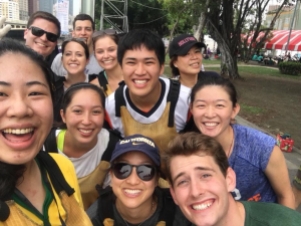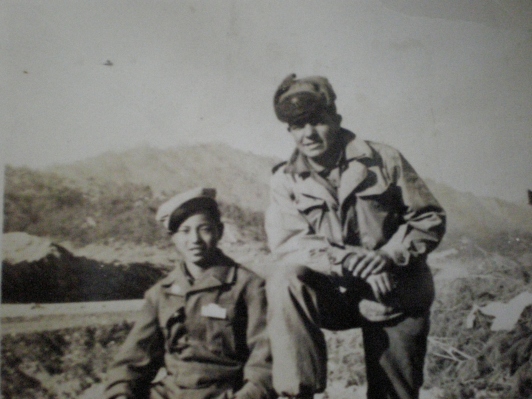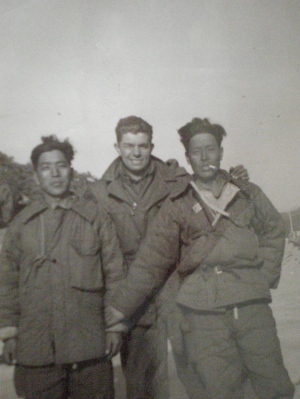This past memorial day, on my flight from Kuala Lumpur back to Kaohsiung, I had the privilege of sitting next to an active-duty member of our U.S. military currently stationed in Okinawa, Japan. During our four-hour flight, we had an incredible conversation that covered just about every topic, including the role of America’s military in 2018, the current geo-political climate of the world, and yes, Mr. Trump. The marine I sat next to told humorous, informative, and enlightening stories about being stationed in Romania, training troops in Bulgaria, and moving to Japan. Towards the end of the flight, I asked him what his current responsibility in the military was, and he talked about how, in his perspective, the U.S. military’s greatest strength is in soft diplomacy. He talked about the need for our soldiers to gain trust in foreign lands by getting to know the locals, understand their culture, and grow to mutually understand one another. Although we were the same age and had taken radically different paths in life, we both somehow ended up on the same flight, headed to the same destination, with the same goal in mind: to advance the virtues of the United States through the use of soft power.
Decades ago, Joseph Nye originally coined this term – soft power – in his critically-acclaimed work Bound to Lead: The Changing Nature of American Power. He wrote that, “if a state can make its power seem legitimate in the eyes of others, it will encounter less resistance to its wishes. If its culture and ideology are attractive, others will more willingly follow… when one country gets other countries to want what it wants, [it] might be called soft power, in contrast with the hard or command power of ordering others to do what it wants.” More recently, Nye has suggested that the “best propaganda is not propaganda,” and that “credibility is the scarcest resource.” Former Secretary of Defense Robert Gates believed in this vision, and advocated that the Bush administration consider “a dramatic increase in spending on the civilian instruments of national security – diplomacy, strategic communications, foreign assistance, civic action, and economic reconstruction and development.”
Not a day passed by in these last eight months that I did not work hard to advance the soft power efforts of our country. As a cultural ambassador for the United States, I was invited to meet Taiwanese President Tsai Ing-wen, had an interview with Taiwan’s Minister of Foreign Affairs Joseph Wu, and gave a presentation to the U.S. Assistant Secretary of State Marie Royce. On a daily basis, I had the opportunity to interact with ordinary people that have never met an American before. I visited at least one high school (in Tainan) that told me that I was the first American to ever visit their school. On many occasions, I was asked representative questions about the United States, and while I always strived to be welcoming and open to dialogue, I always made it clear that I was sharing my opinion, as there is no such thing as a representative American perspective. In truth, I was trying my hardest to avoid the danger of telling a single story.
I also had the opportunity to visit the cold war outpost of Kinmen and even played basketball with students that are living in a former warzone – talk about true soft diplomacy! Kinmen (formerly known as Quemoy) was the site of the last battles of the Chinese civil war, and was later shelled heavily by the PRC’s Liberation Army throughout the 1950’s. The Taiwanese island is so close to the mainland that my cell phone network automatically switched to a mainland Chinese phone carrier! This trip also served as an important reminder of the urgency to study our history so that we may never repeat the mistakes of our past. For me, I still question how I somehow have made it through 13 years of public education (and an additional 8 years of university) without every hearing about the role Quemoy and Matsu played in the Taiwanese Strait Crisis.
Speaking of learning about our past, I also saw the atrocities of war first-hand when I visited Vietnam. Unlike many conflicts, including World War II, the Vietnam War ended in the 1970’s. This means there are millions of people still alive that remember the war like it was yesterday, and one cannot walk a single block in Ho Chi Minh without seeing someone that has been negatively impacted by Agent Orange. It was sad standing at the War Remnants Museum, next to captured American tanks and airplanes, and asking whether all these deaths, destruction, and birth defects were worth it. At the time, many Americans subscribed to the so-called “domino theory,” and believed that if one country were to become communist, all of Asia would quickly become communist. In hindsight, it is clear just how wrong many of those leaders were in our past. In some ways, America in 2018 in similar to America in 1968, because during the war, “the United States was widely unpopular around the world, as it is now… Yet despite unpopular government policies, our openness and self-criticism allowed the American idea to retain its appeal. A free press, independent courts, and a Congress willing to confront the executive branch can provide a similar measure of soft power today.”

It frustrates me to no end when people accuse me of being anti-military because I am anti-war. I have the deepest respect for our armed forces and will be forever grateful for their sacrifices. But we must question, why do we constantly get involved in meaningless conflicts that put our brave soldiers in harm’s way to begin with in the first place? My grandfather, who meant the world to me, served in the Korean War. While we only have a few photos of him during this time period, look at how happy he looks when he is with his fellow Koreans. I particularly love the photos of him standing with Korean children. To me, I have no doubt about it: my grandfather fundamentally believed in the idea of soft power, and worked hard to win over the hearts and minds of the Korean people.
In fact, I was the first person in my family to visit the Korean peninsula since he was honorably discharged almost 70 years ago. Standing in the de-militarized zone and briefly walking into North Korea was an experience that brought many personal feelings to bare. I can only hope that he would be proud of me.
Nothing, however, was as powerful as visiting Hiroshima.
At 8:15am on August 6th, 1945, a U.S. army B-29 bomber dropped an atomic bomb on the Japanese city of Hiroshima, and our world was changed forever. It was surreal being one of the few Americans to ever walk around the atomic bomb dome and the Peace Memorial Museum, and I was at a particular loss for words when I was standing directly underneath the hypocenter of the bomb. When visiting the memorial, it was interesting that the memorial did not solely blame the United States, but rather both countries, for putting their egos in front of the lives of innocent citizens. For me, the hardest part of the day was visiting an elementary school that survived the initial impact, where a majority of the young students were killed instantly.

While visiting Hiroshima was without question one of the most difficult places that I have ever been to, there were many difficult conversations I had throughout my time in Asia. When I met with Assistant Secretary of State Marie Royce, I told her how difficult it was being asked questions about the current administration or our country’s absurd obsession with guns everywhere I went (I encourage all of my fellow Americans to read an op-ed I wrote that boldly declares that our problem with gun violence is #NotNormal). Truth be told, I was asked questions about school shootings and Trump on a daily basis during my time abroad, which were unequivocally the hardest to answer as a representative of our country. It is not necessarily because of Trump’s policies, as I am all for a political disagreement – dissent and diversity of thought and culture is what truly makes America great. Truth be told, it has been embarrassing to be an American abroad during the so-called era of Trump. Simply put, our president does not represent our country well, and respect for America around the world is in an objective freefall (well, except for in two countries: Russia and Israel). As I told our Assistant Secretary last month, it has been hard serving as a cultural ambassador for the United States during this tumultuous time period under an administration that does not believe in soft power.
Why has it been so hard answering question about Trump? Maybe it is because he praises dictators while he is incredibly hostile with our closest allies. He openly mocks disabled people, and makes lewd remarks of women. His Secretary of Education knows nothing about schools while his EPA Director has repeatedly abused his authority. After complaining for years about how much golf President Obama has played, he has played more golf than any other president. Trump and his administration lie about everything, including paying off people that he had had affairs with and meetings during his campaign. He is a proponent of separating vulnerable families at the border and wants to widen the death penalty for drug dealers. He calls African nations “sh*t-hole countries” and calls immigrants of color, “animals.” And to put the figurative sprinkles on top, he neither believes in the power of soft diplomacy nor the mission of the Fulbright Program.
On the contrary, I have seen the innate power of soft diplomacy first hand. I have gotten to know so many amazing people, in a part of the world that is greatly misunderstood by the west. I have come to have a deep appreciation for Taiwanese hospitality, and the importance of standing up for what is right.
At the end of the day, the “greatest threat to the American idea is what we may do to it ourselves. Terrorism is like jujitsu: The small players win if they make the large player use his strength against himself. If we respond to terrorism by becoming less open—economically, socially, and politically—we lose. As George Kennan warned in 1946, at the start of the Cold War, the greatest danger that can befall us is that we shall allow ourselves to become like those with whom we are coping.”
Here is my charge to my fellow Americans: We can do better. Scratch that, we must do better. I encourage you all to get your information and news from objective news sources, such as BBC and NPR, and stop watching outlets such as MSNBC, CNN, or FOX. If you have the opportunity, travel abroad as much as possible, and strive to really get to know the people of foreign countries and their culture and way of life. Try to listen to others more, especially people that do not look like you or may have different worldviews. Push your thinking by watching documentaries and reading books and attending local lectures and talks. Perhaps most importantly, reflect critically on your belief system, and constantly ask yourself why you believe what you believe. If there is anything that I have learned in my first 27 years of life, it is that people are people everywhere. At the end of the day, everyone I have ever met wants their family to be healthy, their kids to be successful, and to be treated fairly and justly. Is that too much to ask?
When President Obama visited Hiroshima, he reminded us that, “we have long known the agony of war. Let us now find the courage, together, to spread peace and pursue a [better] world.” Perhaps I am an eternal optimist (and pacifist), but I fundamentally believe that we can make this world a better place if we try. I mean, why not aim to create good instead of evil? Why not look to make peace instead of war? Why not try to spread love and compassion instead of hate and arrogance?
Now (especially now) is the time for an effort like never before to achieve peace.
Let us all take hands.
This post is dedicated to Anthony Bourdain, someone that knew how to travel and celebrate life better than anyone. He worked relentlessly to show us that we should not be afraid of strangers in our global community, and that people are people everywhere. Thank you for inspiring so many people (including myself) to take this world by storm, Mr. Bourdain.





















